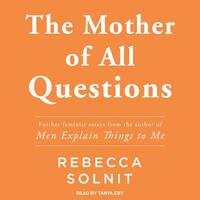Take a photo of a barcode or cover
4,5/5
Ważna książka, przy której miałam mnóstwo emocji. Polecam!
8,5/10
Ważna książka, przy której miałam mnóstwo emocji. Polecam!
8,5/10
I have long loved Solnit's writing and this was no exception! Though slightly behind the times, this is a wonderful comprehensive look at the expansions of feminist discourse from about 2014 onward to the beginning of the Trump era. A tidy little read with a lot to say in Solnit's signature style!
I almost did not read that book. I had been pretty disappointed by "Men Explain Things To Me" by Solnit and I thought this book would have the same issues. But sometimes being a serial book shopper can be helpful.
This collection of essays is amazingly clever and well-written and sometimes even pretty funny. The themes are all interesting and honestly I've said "OMG YES ! YES!" so many times while reading that I was a little concerned somebody would hear me and wonder what I was doing.
My favorite Essay was the one about silence, the longest of the collection. In it, Solnit explains so many important things about how silence kills and silence oppresses and how it is used by the Patriarchy to keep women under its thumb.
Another essay struck me, but as a very sad one. In it, Solnit rejoiced of the fact that men seemed to be more apt to join the feminism movment and she illustrated it by two main examples : Aziz Ansari and Louis CK. The essay was from 2014 or 2015, and it's really sad to see how those two examples actually ended up less that 5 years later. Reading the essay now, while knowing what kind of men those two comedians are, kinda gives another meaning to it. It reads as a cautionary tale to how we should take it when a cishet man calls himself a feminist.
This collection of essays is amazingly clever and well-written and sometimes even pretty funny. The themes are all interesting and honestly I've said "OMG YES ! YES!" so many times while reading that I was a little concerned somebody would hear me and wonder what I was doing.
My favorite Essay was the one about silence, the longest of the collection. In it, Solnit explains so many important things about how silence kills and silence oppresses and how it is used by the Patriarchy to keep women under its thumb.
Another essay struck me, but as a very sad one. In it, Solnit rejoiced of the fact that men seemed to be more apt to join the feminism movment and she illustrated it by two main examples : Aziz Ansari and Louis CK. The essay was from 2014 or 2015, and it's really sad to see how those two examples actually ended up less that 5 years later. Reading the essay now, while knowing what kind of men those two comedians are, kinda gives another meaning to it. It reads as a cautionary tale to how we should take it when a cishet man calls himself a feminist.
I love, love, love Rebecca Solnit's writing so much.
I will read anything and everything Rebecca Solnit writes. She's is easily my favorite essayist and she always writes such short but powerful pieces that cut through the world's bullshit and injustices like a knife through butter. This essay series on misogyny, violence, and the silence of women has earned it's rightful place next to all of Solnit's other works. Brilliant. Highly reccomend.
challenging
informative
inspiring
reflective
medium-paced
Was a little disappointed by this. Solnit writes really well- though not as well here as in 'A Field Guide to Getting Lost', but there were less new, fresh ideas in here than I expected. A lot of the essays were lifted from previous online articles, and I wish some of them had been expanded.
I read Men Explain Things to Me a month ago and I'm happy I was able to follow up so quickly with The Mother of All Questions. It's a continuation of Solnit's previous essay collection with a thankfully more inclusive lens.
The standout essay is A Short History of Silence, about how women are forbidden or prevented from speaking and not heard when they do. It's a truth we hold in our hearts but avoid looking at too closely because man, it hurts.
My heart aches because I know this. I've seen it, not only with myself and women but other marginalized groups. Others say the stories are 'unbelievable', which as Solnit points out, "means those with power did not want to know, to hear, to believe, did not want them to have voices." I'm happy to see that she recognizes the different and varied challenges faced by people of color, those who are LGBTQ*, and others who were often overlooked in Men Explain Things to Me. Solnit also explores what this hyper-masculine culture means for guys, punishing them for showing "soft" feelings and effectively blunting their emotional range as humans.
Jaw dropping and rage inducing facts abound - rape is the most common form of trauma, but PTSD research is directed at male veterans. "Fight or flight" was largely studied in male rats and humans and women often employ a third, until now unrecognized, option. One reason the gun homicide rate hasn't risen is not because fewer people are getting shot, but because medicine is getting better at saving those who are. In fact more people are getting shot. And on and on.
Luckily Solnit also points out things we can all do. Tell your story if you can, and listen and believe those who are telling you theirs. If someone lobs a sexist inquiry your way reply, "Would you ask a man that question?" Do the intellectual work to not see groups (Muslims, women, poor people, etc.) as monolith entities, for that is the road to believing you can attack any member for the entire group's perceived sins.
Overall The Mother of All Questions is more nuanced and inclusive than its predecessor while still packing an eye opening gut punch. Necessary for the times we live in and a hearty recommend.
Thanks to Haymarket Books and Edelweiss for providing a review copy.
The standout essay is A Short History of Silence, about how women are forbidden or prevented from speaking and not heard when they do. It's a truth we hold in our hearts but avoid looking at too closely because man, it hurts.
Being unable to tell your story is a living death and sometimes a literal one. If no one listens when you say your ex-husband is trying to kill you, if no one believes you when you say you are in pain, if no one hears you when when you say 'help', if you don't dare say 'help', if you have been trained not to bother people by saying 'help'.
My heart aches because I know this. I've seen it, not only with myself and women but other marginalized groups. Others say the stories are 'unbelievable', which as Solnit points out, "means those with power did not want to know, to hear, to believe, did not want them to have voices." I'm happy to see that she recognizes the different and varied challenges faced by people of color, those who are LGBTQ*, and others who were often overlooked in Men Explain Things to Me. Solnit also explores what this hyper-masculine culture means for guys, punishing them for showing "soft" feelings and effectively blunting their emotional range as humans.
Jaw dropping and rage inducing facts abound - rape is the most common form of trauma, but PTSD research is directed at male veterans. "Fight or flight" was largely studied in male rats and humans and women often employ a third, until now unrecognized, option. One reason the gun homicide rate hasn't risen is not because fewer people are getting shot, but because medicine is getting better at saving those who are. In fact more people are getting shot. And on and on.
Luckily Solnit also points out things we can all do. Tell your story if you can, and listen and believe those who are telling you theirs. If someone lobs a sexist inquiry your way reply, "Would you ask a man that question?" Do the intellectual work to not see groups (Muslims, women, poor people, etc.) as monolith entities, for that is the road to believing you can attack any member for the entire group's perceived sins.
Overall The Mother of All Questions is more nuanced and inclusive than its predecessor while still packing an eye opening gut punch. Necessary for the times we live in and a hearty recommend.
Thanks to Haymarket Books and Edelweiss for providing a review copy.
This was another great collection of essays. My favorites were "80 Books No Woman Should Read" and "Men Explain Lolita to Me". Rebecca Solnit is smart, funny (even when discussing some sobering topics), and always gets me thinking.
challenging
hopeful
informative
inspiring
Each time I read Solnit's work I am reminded of her eloquence.
This is another excellent essay collection by Solnit. The first section, Silence is Broken, was an outstanding exploration of silence and voicelessness in its many forms. I highlighted so many parts of this book.
This is another excellent essay collection by Solnit. The first section, Silence is Broken, was an outstanding exploration of silence and voicelessness in its many forms. I highlighted so many parts of this book.







